 |
 |
 |
 |
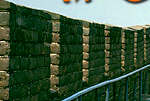 |
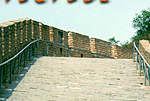 |
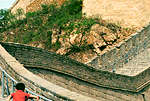 |
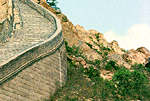 |
 |
 |
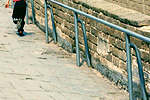 |
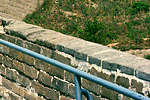 |
 |
 |
 |
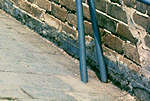 |
|
December 14, 2001 Missing
the Boat?
|
|
Chinese presumably watched in awe and surprise as the Taliban was dispatched rather quickly. I remember hearing schoolgirls and businessmen alike exclaim over the defeat of the much-heralded Taliban. Perhaps the Chinese government felt a tinge of awe mixed with surprise as well as Afghanistan fell to the US-led Force of Righteousness. Maybe a little fear and regret was mixed into those feelings as well. The quick fall of the Taliban and the power vacuum that has yet to be filled by a united and determined all-Afghan regime has "necessitated" the presence of Western (US/UK) troops and military hardware. The Western powers could scarcely afford another war a few years down the road in order to secure the pipeline route through Afghanistan and Pakistan into the sea. This time, security and stability in the region will be ensured. China could have had a say in the new stability of Central Asia, (besides the vague and useless parrotings of Zhang Qiyue, of the Foreign Ministry). But that chance is now gone forever. China, so determined to be a world power and so proud of its newly minted WTO membership badge, is still content to whisper about the UN's role and the opinions of the "international community." The superpower limelight is hogged by the US and, to a lesser extent Russia, with the EU, UK and Japan standing slightly off to the side, while China stands waiting in the wings. China feels comfortable battling over shiitake mushrooms with Japan, but will not match Japan's eagerness to get involved in Central Asia. What China did gain out of the most recent war is not international standing, but a license to kill (which they didn't really need) in Xinjiang, home of Uighur Muslims. China can now count on most of the Western governments to keep their mouths shut about human rights and to duly ignore those who still speak out about the situation. President Bush and Rumsfeld recently informed Russian President Putin that, yes, the ABM treaty will be scrapped in order to make room for a national missile defense system. It seems 9/11 has given governments the right to push policy through that might not have made it had there not been a war on. Russia answered that the scrapping of the treaty would result in an arms race in which Russia would happily participate. Talk of multiple warheads and Cold War levels was tossed around by Russian Generals, as American Generals scoffed at the ability of cash-strapped Russia to engage in an arms race. CHINA'S RESPONSE?"We have taken note of the reports and express our concern over them," said Zhang Qiyue, the foreign ministry spokeswoman, at a regularly scheduled news briefing today. "It is of crucial importance to maintain the international disarmament and arms control efforts." Very powerful words. Of course, there is not much China can actually do to dissuade the US from proceeding with the oh-so-successful NMD program, but for a nation that is expected to reign in East Asia soon, this response is much too weak. China's foreign policy seems to be wracked with internal doubt and possibly conflict. Beijing cracks down on cable companies providing foreign programming because it "disrupts national security, economic order and the dignity of state law," but China is rejoicing over entry into the WTO, which will bring about waves of disruption, especially in the telecommunications sector, when that sector eventually opens up. At the same time that Beijing is cracking down, Guangdong is actively courting cable providers from abroad and Hong Kong. Actually,
I can get Star and ESPN in most hotels in Chongqing, so the crackdown
isn't really a serious move to eradicate foreign television. But
it's the message that counts. China is acting to protect itself
from the foreign invasion that is imminent and needed. On the domestic front, China's Strike Hard campaign, persecution of Uighurs, Falun Gong practitioners and imprisonment of hapless, outspoken village heads and corrupt politicians sends a different message to the Chinese: Don't use this new era as an excuse to start voicing grievances. Last time the government allowed "flowers to bloom," the overwhelming response of the people led to an overwhelming and less pleasant response from the Party. China is wrestling with its role in the world right now and has not yet found the leader that will lead them in one direction or the other. China has been traditionally passive towards international affairs and in a world built by George Washington perhaps this political indifference towards another country's affairs would work just fine. But in our current era, indifference can lead quickly to dependence as others move forward and stake claims in your backyard. This has happened to China in the past – and it may happen again in the future, because as China scours the domestic landscape for threats to its survival, the international community begins to take shape around it. Instead of "sailing toward world significance," the Communist Party may find it has missed the boat. |
Text-only printable version of this article Sascha Matuszak
is a teacher living and working in China. His articles have appeared
in the South China Morning Post, the Minnesota Daily,
and elsewhere. His exclusive Antiwar.com column (usually) appears
Fridays. Archived columns
Sweep 'Em Off the Streets
Chinese Embrace Progress China's
Afghan Agenda New
War May Reveal New Superpower, Part II New
War May Reveal New Superpower A
Chance for a New Friendship? Cheating
as a Way of Life China's
Internet Generation Free
Markets or Supermarkets Sailing
Towards World Significance China's
Youth Revolution |
Please Support Antiwar.comSend contributions to Antiwar.com or
Contribute Via our Secure Server |
|
